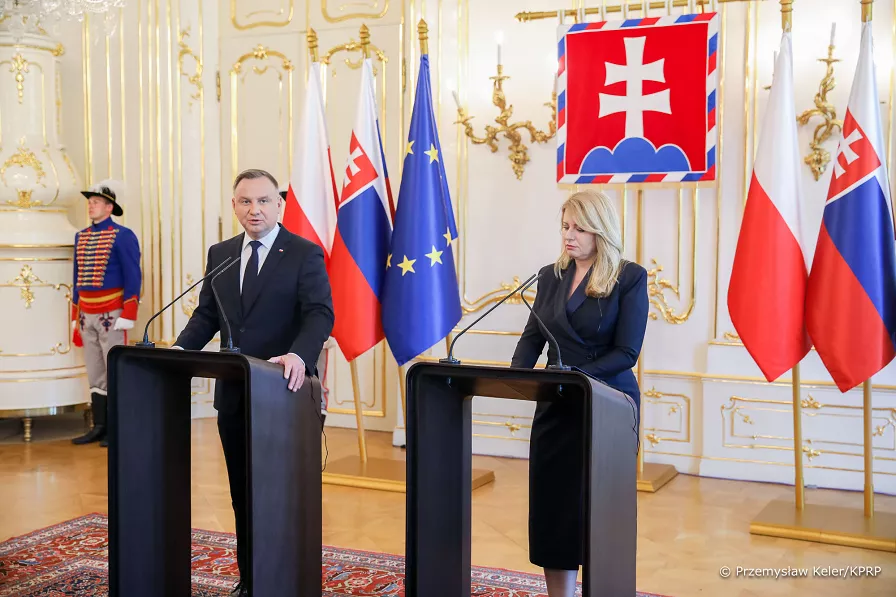A gas interconnector will soon link Poland and Slovakia, Polish President Andrzej Duda announced on Wednesday, allowing the neighbouring countries to support one another and the wider region in ensuring energy supplies after Moscow’s invasion of Ukraine.
“Poland will be able to send gas to Slovakia and Slovakia will be able to send gas to Poland if necessary,” said Duda, speaking in Bratislava alongside Slovakian counterpart Zuzana Čaputová. “The Polish-Slovak neighbourly friendship pays off in many areas, such as security.”
Construction of the interconnector began in 2018, supported by European Union funding of €33 million. The line is scheduled to open this year, and will be able to transmit up to 4.7 billion cubic metres (bcm) per year of gas to Slovakia or 5.7 bcm per year to Poland.
A new gas interconnector between Poland and Lithuania was already launched at the beginning of this month, connecting the Baltic and Finnish with the Polish markets.
Its capacity to transport gas from Lithuania to Poland is expected to reach 1.9 bcm per year in the next five months and the supply capacity from Poland to Lithuania will be 2 bcm per year, the European Commission announced.
“Today’s interconnection is another step in helping this region to be fully integrated into the internal EU energy market, diversifying away from Russian gas,” said EU Energy Commissioner Kadri Simson attending the link’s inauguration ceremony, as quoted in a statement.
Ukraine will now be able to buy gas through the LNG terminal in Lithuania
The Poland-Lithuania Gas Interconnector "GIPL" has already started operating, which, along with other European countries, will connect Lithuanian system with Ukrainian one. pic.twitter.com/5r7kpFTve6
— Elena Faige Neroba (@ElenaNeroba) May 1, 2022
During Duda’s visit, the leaders also discussed the issue of Ukraine’s ambitions to join the EU. Čaputová proposed that Slovakia and Poland should lobby among countries that remain sceptical.
“I suggested to President Duda that we visit together some leaders of Western countries who have a more restrained attitude when it comes to candidate status in the EU for Ukraine,” said Čaputová, quoted by the Polish Press Agency (PAP).
Although she did not name any specific countries, these may include France, whose president, Emmanuel Macron, recently said that Ukraine’s accession could take “decades”, as well as Germany, which told Kyiv there will be “no shortcut” to EU membership.
#Slovakia and #Poland stand with our neighbour #Ukraine. With president @AndrzejDuda we agree that our solidarity with Ukraine is firm, our partnership strong & our cooperation critical. We support Ukraine #EUmembership and in rebuilding & preserving peace/security in our region. pic.twitter.com/GrB4CCY6Xy
— Zuzana Čaputová (@ZuzanaCaputova) May 11, 2022
“I accepted the proposal of President Čaputová to undertake a mission to lobby for Ukraine among EU countries, especially where there are doubts that Ukraine should get this status quickly,” said Duda.
“What is needed today is a clear signal from the West that Ukraine is part of it, that Ukrainians are accepted, that they are part of the community and that the West understands their aspirations,” he added.
Just two days after Russia’s invasion in February, Duda called for Ukraine to be given an “express path” to EU membership.
Poland has been one of the most vocal countries in the European Union lobbying for “de-Russification” of European energy. The country has also worked for years to decrease its own dependency on supplies from Moscow.
Last week the European Commission proposed some of its toughest measures yet against Russia, including a total ban on oil imports. But Hungary and Slovakia, heavily dependent on Russian supplies, raised objections.
The EU has already pledged to reduce Russian gas imports by two thirds by the end of 2022, while Poland and Bulgaria saw Gazprom cut off their gas supplies two weeks ago after they refused to pay in roubles.
Main image credit: Przemysław Keler/KPRP

Alicja Ptak is deputy editor-in-chief of Notes from Poland and a multimedia journalist. She has written for Clean Energy Wire and The Times, and she hosts her own podcast, The Warsaw Wire, on Poland’s economy and energy sector. She previously worked for Reuters.




















